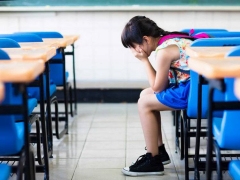Child offended at school: the advice of a psychologist
School is the first institution in the life of every person. His further development, creative abilities, the desire to learn and reach new heights directly depend on whether a student is offended and how comfortable and confident he feels.
School and the consequences of grievances
It’s hard to focus on your classes if you’ve become an object of ridicule for your classmates. And if offenses are more serious, the consequences are likely to be deplorable and will be expressed in the absence of willpower, inability to make decisions, the development of complexes, mistrust or, conversely, in bitterness.
How to understand that a schoolboy is insulted or dirty, if he is silent?
Signs can be:
- The child refuses to go to school, seeks any reason to stay at home, his academic performance declines.
- The kid is upset and depressed on weekdays, but happens in good spirits at the weekend.
- External signs - beatings, damaged items or their absence.
- Complaints of headache or abdominal pain (perhaps these are signs of psychological problems).
How to choose an outcast
Most people believe that the reasons for the persecution are external or social differences from the majority. In fact, the object of ridicule can be anyone. One wrong step or secret, scattered across the class, undermines reputation. Neither different wealth, nor features of appearance cause harassment. Far more important are family relationships. If your offspring is calm and firm, as a rule, evil jokes quickly stop.
Who is more often attacked:
- "victims" - doubters, tangled, apathetic. Do not repel insults.
- "aggressors" - often they themselves attack others, they give too strong a reaction to provocations.
- guys from dysfunctional families - inaccurate, late for the lesson, poorly dressed.
In order that the crumbs would be good in any society, cultivate in it an inner core, dignity and self-confidence.
For more information about children who are often offended, look in the video of a clinical psychologist Veronika Stepanova - get valuable advice to parents.
Parents' mistakes or how to react is NOT worth it.
- Leave one, giving him the opportunity to independently deal with the problem. Your child, perhaps, is not ready for this situation, it is advisable to teach him how to fight back correctly.
- Transfer it to another school or classroom. There are cases when it is necessary to react quickly and save the child. In this case, translation is possible, but there is no guarantee that everything will not be repeated at the new place. It will be difficult for a schoolboy to adapt in a new team. in the previous one he was already defeated. And in the old one the victim is replaced by another.
- Fully take the decision of the conflict in their hands. Find out the relationship with the enemies, their parents, teachers. First, it is possible to further harm and provoke an increase in aggression, not only from the side of the guys, but also from the mentors. Secondly, one should not take any action without discussing it with the student.
Listen to the feelings, trust and respect his opinion.
How to be or first aid
First of all, evaluate what is happening and the magnitude of the problem.
Can help:
1. Confidential heart-to-heart talk
Let him ask the question "why me?" - so you find out what he did to the attacker, if nothing, then the reason is not in him. Son or daughter are not guilty in this situation.
2. A child is subject to group harassment in only one place (educational institution, section)
- Find out if he needs help. Offer your solutions to the problem. The role of father and mother is great, they need emotional support: outside an aggressive-minded society, it must be understood, accepted, needed.
- Offer to arrange a children's holiday in order to try on, and, perhaps, make friends with children.
- Write down in the section, better in sports. He will find like-minded people there and will feel firmer. In general, everything that distracts a student - a hobby or an idol - will give him the opportunity to abstract, distract and recover morally.
- Help to understand the conflict, analyze your behavior and offenders. Perhaps he himself is a provocateur. Do not push him, explain how to behave.
- Report that the appearance of nothing to do with it, it will protect him from the development of complexes. He should know that he is loved the way he is, wearing glasses, full or with a scar on his face.
- The reason most often in violators. As a rule, those who want to assert themselves and drown out their own complexes are mocking the weak. Explain to your offspring that those who do this feel inferior and weak. All that is worth experiencing them is a pity, because they have not found a better way to fight fears. This installation can be a defense: "You want to offend me, because you yourself are afraid." Usually, when they touch the most painful, the desire to attack disappears.
- Sometimes it helps to ignore, if there is no reaction, tears and tantrums, the offenders quickly get tired of the victim. For example, if you take a notebook, you can say: “You’re tired of playing with it, you’ll return it.” Soon it will be thrown on the next desk.
- Do not show tears to classmates. Crying is helpful to relieve stress, but not to demonstrate weakness to tormentors. There is no moral satisfaction, if the victim does not suffer.
- Contact your school. The class teacher or head teacher should organize a class hour, the theme of which will be "child cruelty, group persecution." For clarity, it is better to show a movie on the subject (effigy) or cartoon (ugly duckling). The main thing - do not point directly to the offenders. Otherwise, they will close and take the position of defense (And here I? He started the first, etc.)
After the film is shown, it is valuable to point out the basic values, comicity and ugliness of the pursuers.
Mentor explains how disgusting and dangerous what is happening. Often children are not aware of the amount of damage that is being inflicted on the injured party.
Of course, the quality of the class hour depends on the professionalism of the manager. Discuss the lesson progress with the teacher in advance.
If contact with the teacher cannot be found, you should contact the school principal, and in case of physical abuse, do not delay contacting the law enforcement agencies.
3. When a child is a victim in any society (street, camp)
You should contact your family psychologist to find out why he is drawing aggression towards him. In the case when there is a firm position in an educational institution, clear rules that it is impossible to insult and attack others, and teachers do not show aggression, do not humiliate students, then any children, even with pronounced features, will be accepted. The society will develop the best qualities - kindness, tolerance and compassion.
The teacher needs to hold events, identify hidden bulling (eng. Aggressive prosecution of one of the team members), not to hush up the problem. Harassment occurs not only because of aggressive children, but also because of insensitive, inattentive adults. Insensitive to the problem, they do not intervene, explaining that the boy is “guilty himself”, “cannot stand up for himself”, “strange”, etc.It is necessary to inform teachers how to deal with violence. The correct way is a complex, influence on the whole group. Working with one aggressor or only with a victim may not give results.
The duty of the class teacher is to constantly control the atmosphere in the group. If after the meeting the children agree that they do not want to live in a team where someone is being bullied, this is the beginning of the recovery of the team. It will be good to interest pupils in joint work, teach them to show themselves without the use of force.
Unselfish exchange of experience, previously unknown knowledge and achievements, as well as unusual games will help). "What I have learned over the summer" is a lesson that will help everyone show their best qualities, demonstrate their strengths. This can reduce the dominance of some children over others.
Develop inner strength or raise successful offspring:
- Express your admiration, even if your child is not successful. Let the baby is not afraid to start something, because he will know that you appreciate the effort.
- Excessive attention and care prevent your child from taking responsibility in their own hands.
- Do not expect too much. Especially if the expectations do not match his age. Everything has its time, let him make a choice on his own.
- Let me ask questions. Curiosity is a good exercise for development.
- Do not be angry and do not criticize. Of course, say, if he did something bad, but it is better to support him and offer options for action.
- Do not be too strict. Of course, parents should have credibility, but do not go too far, do not be too demanding.
- Learn perseverance. Explain that victories do not come immediately, do not give up.
Everyone wants his children to be healthy and happy. To achieve this, you need together, together to take up the problem. It is much easier to prevent bullying than to restore the injured souls of victims and aggressors. Not to be indifferent, to unite for a common purpose. Do not forget that other children do not exist.
In the next program, the child psychologist of the Mriya school, Victoria Naida, gives advice in a situation when a child is offended at school.
Be sure to look at the following video, where the advice is given by psychologist Victoria Lyubarevich-Torkhova.






















